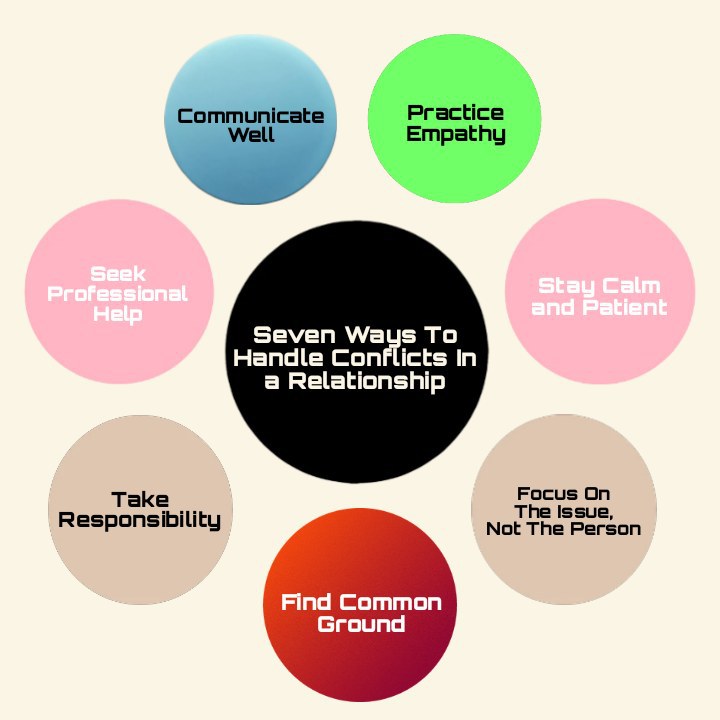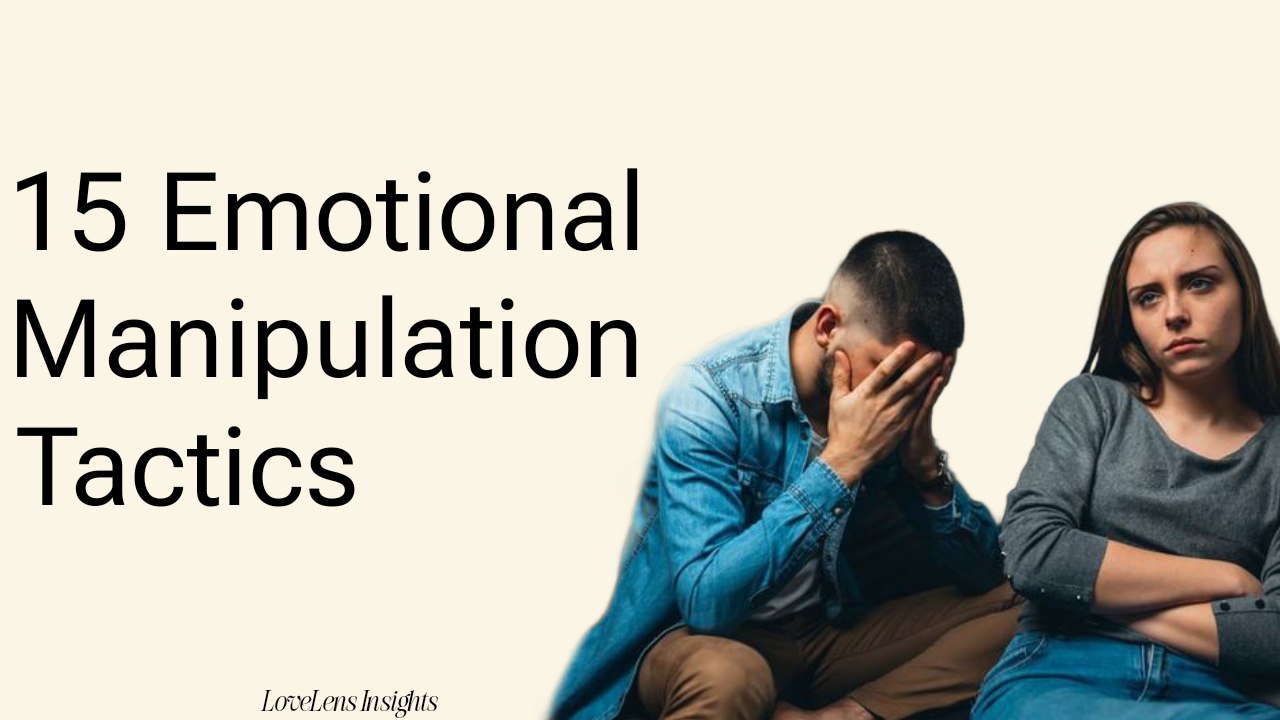
Table of Contents
What are Relationship Conflicts?
A conflict in a relationship is any kind of disagreement, struggle, or heated debate between two people in a relationship. These conflicts arise from differences in opinions, values, needs, or any other shared interests. For instance, you and your partner can have conflicts over specific areas such as finance, how to raise children, habits, and more.
Conflicts can occur in any type of relationship, including romantic, family, friendship, or professional settings. They create intense moments which often affect some aspects of the relationships such as communication or the overall connection.
However, it’s important to note that this article focuses on conflicts in romantic relationships. Resolving these conflicts typically requires open communication, and empathy, and sometimes involves compromises to find a mutually satisfactory solution.
Conflicts in Healthy vs. Unhealthy Relationships
Not every relationship conflict is bad. Conflicts in healthy relationships occur when partners disagree on a specific issue but still maintain their basic respect for each other. Partners communicate openly and honestly, resolving conflicts constructively without blame or resentment.
They respect each other’s boundaries and individual differences, and decisions are made collaboratively. Trust is a cornerstone, with each partner confident in the other’s loyalty and intentions. Emotional and physical safety is prioritized, and both partners work to maintain a balanced, supportive, and loving environment.
On the other hand, conflicts in an unhealthy relationship often feature frequent arguments or silent treatments, where communication is either poor or aggressive. Trust may be lacking, with jealousy, suspicion, or dishonesty creating tension. One partner might try to dominate or control the other, leading to an imbalance of power.
Additionally, boundaries are often ignored, and disrespect may be common, with one partner belittling or criticizing the other. Emotional or physical safety may be compromised, leading to a toxic environment where one or both partners feel trapped, unhappy, or unsupported.
While conflict in healthy relationships make the partners feel more connected, as they have gained a better understanding of each other’s needs, an conflict in an unhealthy one creates lingering issues that result in emotional distance, as destructive conflict behaviors prevent true resolution between the two parties.
Common Causes of Relationship Conflicts
When two people fall in love with each other and their relationship progresses, they get to know themselves on a deeper level. They understand their likes, dislikes, beliefs, and so much more. These factors also lay the foundation from which many conflicts arise. Here are some major causes.
1. Differences in values and beliefs
A difference in values and beliefs affects how partners view important aspects of life. When partners have different perspectives on key issues like family, religion, finances, or lifestyle choices, it can lead to disagreements and tension.
For example, one partner might prioritize career advancement while the other values work-life balance, leading to conflicts over time management and priorities. Another typical example is when a partner is a non-smoker and another is a smoker, resulting in personality clashes.
Differences like this can make it challenging to agree on decisions, resulting in ongoing arguments and dissatisfaction. If it’s not addressed with understanding and compromise, these conflicts can create a sense of division and weaken the connection between both partners.
2. Lack of Communication
When partners express their feelings, thoughts, or needs in the wrong way, usually by yelling or through condescending words, it can negatively affect the relationship. Situations like this lead to arguments, constant bickering, misunderstandings, and unmet expectations. This can cause one or both partners to feel neglected, unappreciated, or disconnected.
Similarly, the lack of clear communication when a partner is conflict-avoidant can result in conflicts. As time goes by, small problems escalate into bigger conflicts, especially when one of the partners refuses to talk openly issues bothering them.
Rather than developing emotional intimacy with their partner, they could bottle their feelings or occasionally let things slide. This process could unconsciously build up resentment, as issues that could have been resolved early on are left unaddressed. This later weakens the bond between the individuals in the relationship.
3. Over-Communication
It should be clear that over-communication also results in conflicts. This happens when a partner tries to talk through every detail of the relationship, bringing up issues repeatedly or insisting on resolving conflicts immediately, even when the other person needs space or time to process.
Over-communication can make your partner feel overwhelmed or suffocated by constant discussions. It creates tension, making the other partner feel like they’re being scrutinized or not given room to breathe. This can lead to frustration and resistance, as one partner may feel their boundaries are being ignored. It’s important to balance communication with respect for each other’s emotional needs and personal space to maintain a healthy dynamic.
4. Power and Control
Wanting to have control and power over your partner is another cause of relationship conflict. This generally happens when one person enjoys feeling superior to another. This often manifests in attempts to make decisions for the other person, dictate how they should behave, or limit their independence.
Such behavior can create an imbalance, where the controlled partner feels oppressed, disrespected, or undervalued. Over time, this dynamic can lead to resentment, anger, and a breakdown in trust.
The controlling partner may believe they are acting in the best interest of the relationship, but this approach often stifles the other person’s autonomy and leads to ongoing tension. Partners should try to understand that intimidation drives out any intimacy in the relationship, while empathy and respect for each other encourage it.
5. Unhealthy Criticism
Criticism can be a major cause of conflict in relationships when it becomes frequent or harsh. When one partner consistently points out the other’s flaws, mistakes, or shortcomings, it can create feelings of inadequacy, defensiveness, and resentment.
Criticism often focuses on personal attacks rather than constructive feedback, making the criticized partner feel attacked or unloved. Over time, this can erode self-esteem and trust, leading to a toxic environment where both partners feel disconnected or hostile.
Rather than fostering growth, criticism can push partners apart, as the person being criticized may withdraw emotionally or respond with their own negative behaviors. For a relationship to thrive, it’s important to replace harsh criticism with respectful communication and constructive feedback, focusing on problem-solving rather than blame.
7 Ways to Handle Conflicts in Relationships
Many relationships experience conflicts over time. However, dealing with these conflicts is essential for maintaining a healthy and strong connection. Here are seven effective conflict resolution strategies to deal with them:

1.Communicate Well
No partner reads minds. A recent study that involved couples who have been married for 40+ years shows that communication is one of the strategies in resolving conflicts effectively.
Hence, if there is a need to address issues directly with your partner, address them without resorting to passive-aggressiveness. Express your feelings clearly, and listen actively to your partner’s perspective.
With open-mindedness, let them truthfully know how you feel about a situation. This prevents misunderstandings and informs them about what’s going on. Sometimes, your partner may not be aware they did something bad unless you point it out. As a result, communicate respectfully to prevent future problems.
Here are some other tips to consider when communicating with your partner:
- Choose the right time and place to have the discussion.
- Be clear and direct about the subject matter.
- Practice active listening during conversations. Avoid interrupting your partner when they talk.
- Avoid blame and defensiveness during the conversation. This will only prevent you from resolving the conflicts.
- Stay calm and seek common ground.
Doing this enables you to work through challenges together and build a more resilient, successful relationship. Remember that partners need to communicate openly about their values and find common grounds or mutually acceptable solutions.
2. Practice Empathy
Empathy helps to build compassion and reduce defensiveness during conflicts. It involves putting yourself in your partner’s shoes and trying to understand their thoughts, feelings, and perspectives. This approach enables you to see beyond your own point of view and acknowledge the validity of your partner’s emotions and needs.
Empathy helps to diffuse tension, creates a safe space for open communication, and fosters a deeper understanding of each other. When you actively seek to understand and share your partner’s feelings, you can resolve conflicts more effectively and strengthen the bond with each other.
3. Stay Calm and Patient
Your calmness and patience are a healthy way to bring effective results to the problems at hand. When you remain calm, you think more clearly, communicate effectively, and respond more thoughtfully. A calm and respectful demeanor prevents escalations, misunderstandings, and hurtful comments.
Similarly, patience allows you to take a step back, reflect on the situation, and provide control over your actions. It prevents confrontation, especially ones that will only escalate the problems. To remain patient, take a deep breath or step away for a moment if you feel overwhelmed. This helps you approach the situation more rationally.
Plus, staying calm and patient creates a safe and constructive environment for understanding each other’s perspectives and resolving conflicts. It further de-escalates tensions, builds trust, and fosters a more respectful and empathetic dialogue, ultimately leading to a stronger relationship.
4. Focus on the Issue, Not the Person
When conflicts arise, it’s easy to get sidetracked by personal attacks, criticisms, or defenses. However, this approach can lead to hurt feelings, defensiveness, and further escalation. Instead, concentrating on the specific issue or behavior causing the conflict allows for a more constructive and respectful conversation.
Criticize the problem, not your partner. Avoid personal attacks or bringing up past grievances that are unrelated to the current conflict. Separating the problem from the person enables you to address the root cause of the conflict without making general attacks or taking things personally.
This approach promotes a more objective, solution-focused discussion, leading to a more effective and respectful conflict resolution, and ultimately, a stronger and healthier relationship.
5.Find Common Ground
When conflicts arise, it’s easy to get stuck on opposing views, but seeking common ground helps shift the focus from differences to shared interests, values, or goals. Compromise is also key, as it helps to find a middle ground that respects both partners’ needs and feelings.
This also involves working on your own behavior. If you pay close attention, subtle changes you make will impact your partner’s actions, generally resulting in changes with them as well.
Through the quest for agreement, you can build bridges, establish a sense of unity, and create a foundation for compromise. This approach shows that you value each other’s opinions and intend to find mutually beneficial solutions. Finding common ground helps you remember that you’re on the same team, working together to build a stronger and more resilient relationship.
6.Take Responsibility
Although blaming the other person is easy, taking ownership of your actions, words, and emotions can help diffuse tension and create a constructive dialogue. That’s because owning up to your mistakes or contributions to the conflict shows maturity and can help de-escalate the situation.
When you acknowledge your role in the conflict, you show accountability, maturity, and a willingness to grow. This approach also helps to prevent defensiveness, promotes self-reflection, and encourages personal growth. Taking responsibility for your actions demonstrates respect for your partner’s feelings and perspective, thus creating a safe space for open communication and encouraging conflict resolution.
7.Seek Professional Help
Finally, seeking professional help is a wise and proactive approach to handling conflict in relationships. If conflicts become too frequent or severe, consider seeking help from a therapist or counselor. A couples’ therapy offers solutions to help you both navigate conflicts more effectively.
A trained therapist can also help you communicate more effectively, identify patterns and cycles of conflict, and develop healthy conflict resolution strategies. When you seek help, you demonstrate a commitment to your relationship and a willingness to invest in its growth and success. This proactive approach can help you navigate challenging times, strengthen your bond, and build a fulfilling and healthy relationship.
Key Takeaways
Conflicts are 100% natural in relationships. When they arise, your main priority is to tackle them head-on together. Couples who experience conflict and resolve together can grow stronger and make their relationship work. As they learn about each other’s feelings and thoughts, they can develop better ways to solve the problem, making their relationship more valuable and resilient.
That said, here are a few key points to consider in resolving conflicts together as a couple:
- Communicate well to prevent misunderstandings and tackle the situation together.
- Be empathetic. Try to understand issues from your partner’s feelings to strengthen the bond with each other.
- Practice patience and calmness to prevent issues from escalating and approach the problem more rationally.
- Address the issue, not the person. This helps you to deal with the root cause of the conflicts without making personal attacks on your partner.
- Find common grounds to show you value each other’s opinion and intend to find a solution together.
- Take responsibility to show maturity and de-escalate the situation.
- Seek a professional to help you navigate the conflicts more effectively.







